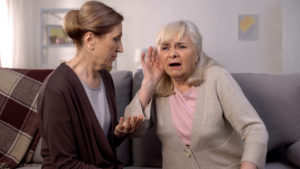
But you could be completely fine too.
Attention is an interesting thing. Your senses all have different jobs, but your ability to see and hear, for example, may be in competition. Therefore, if you’re watching the birds through the window or doing some reading, you may not necessarily hear the person talking to you or the phone ring in the other room.
It can work the other way too. How many times have you been driving down the street looking for an address, only to turn on the radio down or cease a conversation to help you “see”?
There is evidence to suggest that you can only pay so much attention. Both your ears and eyes are trying to process what’s coming at them, but they are essentially working at a limited capacity. To see effectively, you must turn down the volume on auditory input.
When you’re using one sense heavily, like looking at something, it could take a cost from another, like your ability to hear.
Your body does this naturally. You know that turning the radio down won’t improve sight. You also know that to better hear someone speaking to you, you don’t necessarily have to look away from what’s captured your gaze. But many times, it just happens.
When your attention capacity is being directed in one area, other areas can slow down. This can become more pronounced with fatigue, age, or depression.
So, just because people are saying you can’t hear them, it’s possible that you’re just not paying attention. You can test this by offering undivided attention when people speak to you.
Next time you’re chatting on the phone, for example, turn the television off. Immerse yourself in the conversation so you’re truly listening to what your counterpart is saying.
The same goes for in-person communication. When you’re watching television or scrolling through your phone and someone speaks to you, ask for a moment, finish what you’re doing, then offer them your undivided attention.
You may notice people start saying your hearing is getting better!
Of course, if these efforts aren’t making a difference, it’s best to make an appointment with your doctor. The sooner defective hearing is assessed and treated, the better your hearing and health will be.